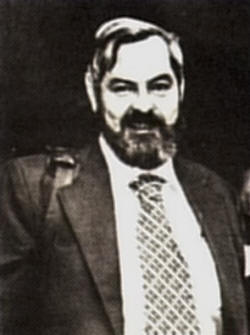Queer Places:
University of Cambridge, 4 Mill Ln, Cambridge CB2 1RZ, UK
Harvard University (Ivy League), 2 Kirkland St, Cambridge, MA 02138
 Harry Gordon Johnson, OC (26 May 1923 – 9 May 1977) was a Canadian economist who studied topics such as international trade and international finance.
Nobel laureate James Tobin said about him: "For the economics profession throughout the world, the third quarter of this century was an Age of Johnson. ... It was his impact on his own profession ... that justifies calling the era his Age."[1]
He was a Cambridge Apostle.
Harry Gordon Johnson, OC (26 May 1923 – 9 May 1977) was a Canadian economist who studied topics such as international trade and international finance.
Nobel laureate James Tobin said about him: "For the economics profession throughout the world, the third quarter of this century was an Age of Johnson. ... It was his impact on his own profession ... that justifies calling the era his Age."[1]
He was a Cambridge Apostle.
Harry Gordon Johnson was born on 26 May 1923 in Toronto, Ontario, Canada, the elder son of two children of Henry Herbert Johnson, newspaperman and later secretary of the Liberal Party of Ontario, and Frances Lily Muat, lecturer in child psychology at the Institute of Child Study of the University of Toronto.
Johnson was educated at the University of Toronto schools and then obtained scholarships to the University of Toronto, where he studied law and economics. According to W. Max Corden in the Oxford Dictionary of Biography, it was at this time that he "developed an interest in the history of thought and was much influenced by Harold Innis's lectures and ideas on Canadian and generalized economic history."[4] He graduated in 1943 and subsequently became, for one year, acting professor and sole member of the economics staff at St Francis Xavier University, in Antigonish, Nova Scotia. "In 1944", explains Corden, "Johnson volunteered for active service in the Canadian armed forces and, after training, was sent to England in 1945, eventually doing clerical work in Canada House."[4] This was then followed by further study at Jesus College, Cambridge, where he obtained a first-class BA degree in economics under the tutelage of the Marxist economist Maurice Dobb; a return to the University of Toronto, where he earned his MA degree; and then finally doctoral research at Harvard University, where he completed the course work requirements in three terms.[4][5][6] It was while at Harvard that he became a follower of the ideas of Joseph Schumpeter.
In 1948 he married Elizabeth Scott, daughter of Harold Victor Serson, civil engineer. She later became one of the editors of the collected writings of
John Maynard Keynes. They had one son and one daughter.
Appointed professor of economics at Manchester University in 1956, he left upon being appointed Professor of Economics at the University of Chicago from 1959 (and from 1969, the Charles F. Grey Distinguished Service Professor) until his death in 1977. He was also Professor of Economics at the London School of Economics from 1966 until 1974. And he briefly was professor at the Graduate Institute of International Studies in Geneva until his death. He was twice Editor of the Journal of Political Economy.[2] He had a stroke at age 49 and died prematurely from a second stroke at age 53.[3]
In 1976 the Canadian government named him an officer of the Order of Canada and in 1977 he was named a distinguished fellow of the American Economic Association.
The Canadian Economics Association awards an annual Harry G. Johnson Prize for the best paper published in the Canadian Journal of Economics.
My published books:


BACK TO HOME PAGE

- https://en.wikipedia.org/wiki/Harry_Graf_Kessler
- Woods, Gregory. Homintern . Yale University Press. Edizione del
Kindle.
 Harry Gordon Johnson, OC (26 May 1923 – 9 May 1977) was a Canadian economist who studied topics such as international trade and international finance.
Nobel laureate James Tobin said about him: "For the economics profession throughout the world, the third quarter of this century was an Age of Johnson. ... It was his impact on his own profession ... that justifies calling the era his Age."[1]
He was a Cambridge Apostle.
Harry Gordon Johnson, OC (26 May 1923 – 9 May 1977) was a Canadian economist who studied topics such as international trade and international finance.
Nobel laureate James Tobin said about him: "For the economics profession throughout the world, the third quarter of this century was an Age of Johnson. ... It was his impact on his own profession ... that justifies calling the era his Age."[1]
He was a Cambridge Apostle.
